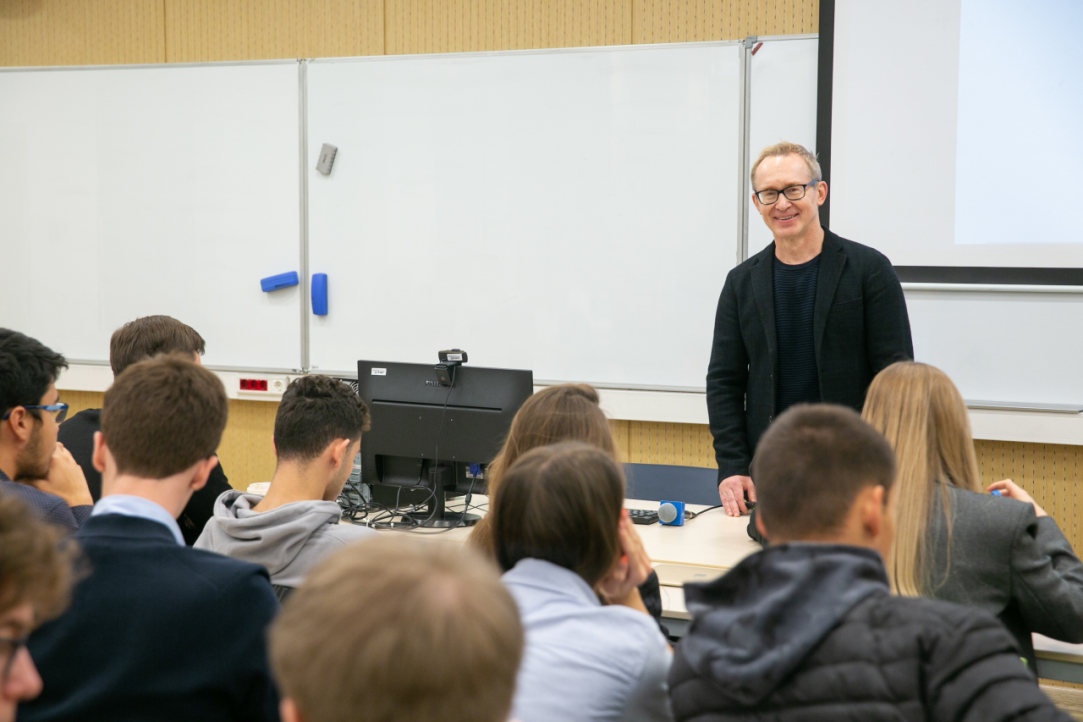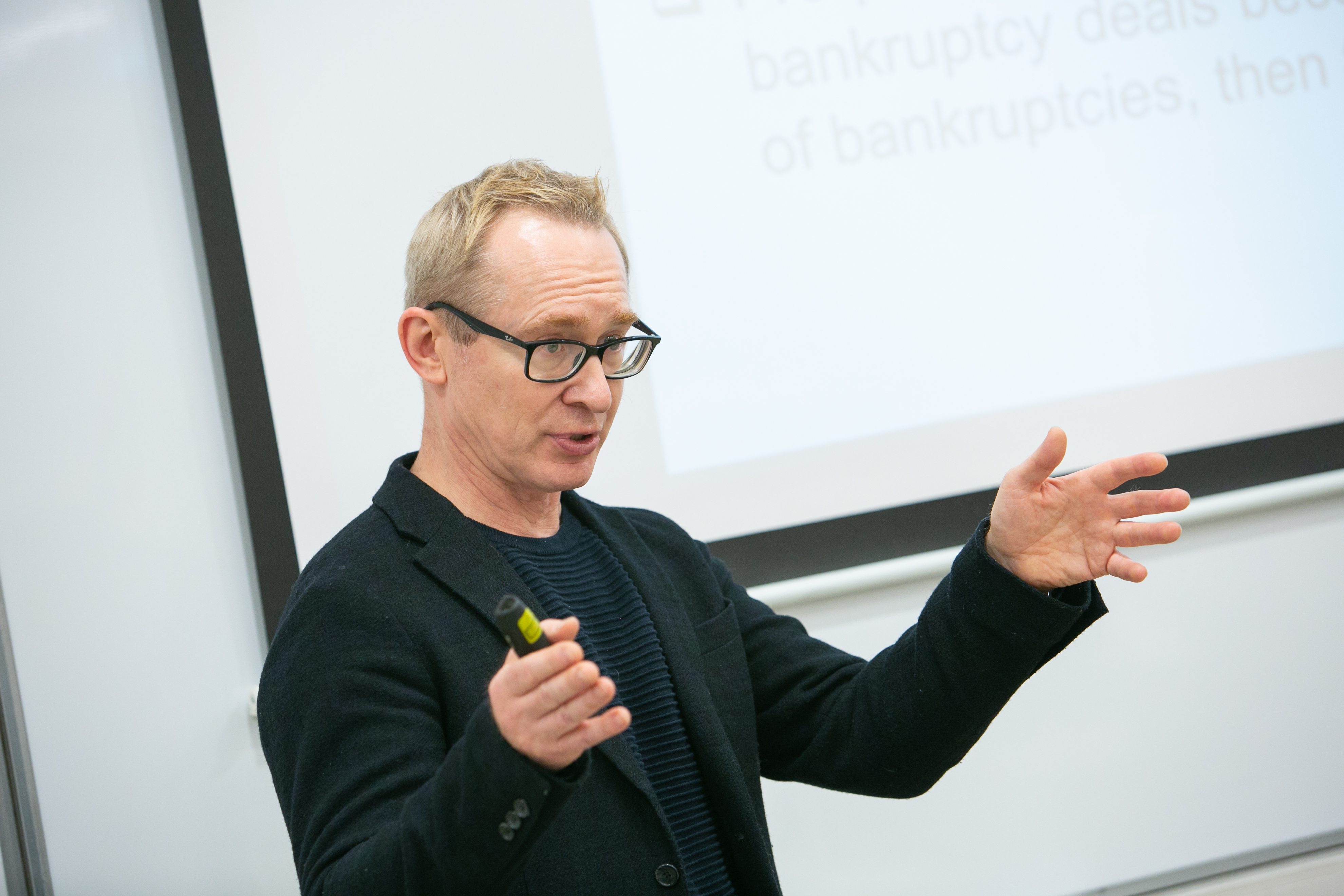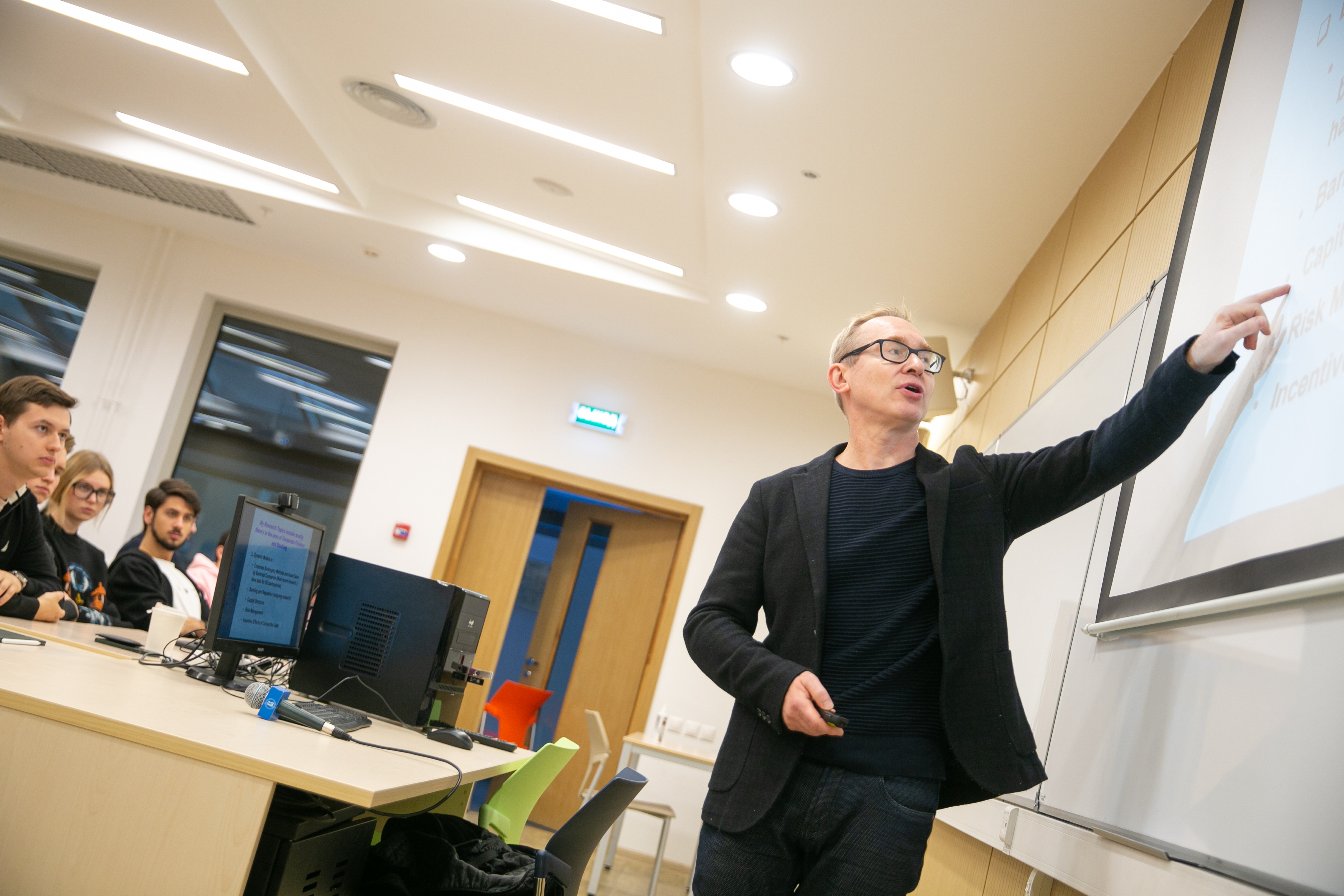"Conferences Publicly Push Important Research to New Levels"

During his visit to ICEF, Sergey Tsyplakov, a professor in finance at Moore School of Business of the University of South Carolina, delivered a lecture to students and contributed to ICEF-CInSt 11th International Moscow Finance Conference as a keynote speaker. In this interview, Sergey shares what surprised him about ICEF students, why scientific paper reviewing may not always be objective, and why people on Wall Street read academic research.
What makes ICEF an attractive venue for you as a research presenter?
ICEF is a leading finance and economics school in Moscow and Russia at large, and it boasts a team with impressive academic background, who get their research published in the world’s top journals. What is more, I feel inspired by communicating with the Russian students. There’s currently no joint research between me and ICEF faculty, but we keep on exchanging ideas, which helps me to adjust my own focus.
What field do you specialize in?
I am more into theoretical research. My career began with the study of capital asset management models. I went on to study risk management and corporate hedging under stochastic volatility. Some of my papers discuss bank bailout strategy optimization and have been produced in co-authorship with empirical researchers, who kindly provide me with empirical data and test the models that I generate. My current research focus is on corporate and banking bankruptcy, and it, too, involves empirical research for model development.
Is it a common practice for theoretical researchers to team up with empiricists?
Not very common. Finance theorists are massively outnumbered by empiricists, accounting for 15 to 20 per cent in the total number of people involved in financial research. This makes theoretical research in finance a rare specialization. As you progress and evolve into an experienced researcher, you become curious about how the models you’ve generated benefit financial forecast.
Theorists tend to become so engrossed with their models, they don’t raise their heads to see what’s going on in real-life world and whether their models have connection with reality. In economic and financial research, academics tend to focus more on making beautiful mathematical equations – which make for a nice material for publications – but this often leads to their models standing far apart from reality. The models that I am working on are more complex in nature, they operate on a variety of factors influencing managerial decision-making. My models are mostly numerical and devoid of nicely arranged proofs, but I see them as reflecting the reality for which they have been generated.
I see the primary task of models as prompting corporate moves for more effective capital asset and risk management
Models should be such that they enable banks and corporations to achieve the right decision-making and regulators and governments to plan their next moves. We should be aware that our papers get read not only by our colleagues but also people on Wall Street. We are responsible for what we write, as there are companies that use our models in their calculations, often without us knowing about it. Models get copied and modified for corporate use, while their developers remain unaware of this fact.
What were the highlights of your lecture U.S. Corporate Bankruptcies you delivered to the students of ICEF?
I designed my presentation to tell the students about the research I am currently pursuing and what I generally specialize in. It mentions my recent article on optimal framework for bank bailout regulation – the topic that I have been working on for the past five years and that led me to take up a new related topic, which is bankruptcy of non-financial companies. In my lecture, I shared my ideas with the students and spoke about how bankruptcy process is effected in the United States and about the legal side of it. Being a global financial phenomenon, bankruptcy is of interest to student audiences in both Russia and the USA.

It was a highly interactive lecture and it was followed by a very productive discussion. I teach at the University of South Carolina and have a pretty good idea what questions to expect from student audience and how many, but those asked by the students of ICEF came as a surprise – there were some twenty questions and they steered my lecture towards the areas my audience wanted to know more about. They made me digress multiple times, but those digressions proved reflective and produced ideas that didn’t sound trivial. We went on to discuss after the lecture, and there was a couple of points that I myself took note of.
Why did you decide to join the ICEF Finance Conference? What were your expectations?
I did a talk about Bank Bailouts – a review presentation that sums up my theoretical work on optimal, data-based bailout strategies. When Financial Crisis hit the American banks, many of them suffered consequences that were negative in terms of capitalization, the risk of bankruptcy was faced even by large banks. The situation required the American regulators to inject a lot of equity into those banks for them to stay afloat and to avoid a deeper economic crisis. My study discusses the results.
For me, ICEF’s conference is one of the most interesting venues. It brings together strong participants and its every session, and the time between the sessions, is filled with heated discussions. My talk raised a lot of questions from the audience and people who joined online. Some gave me hints on where in my model I could make modifications and adjust my presentation and the paper for better positioning within my research domain. I gained a valuable feedback.
This wasn’t my first talk at ICEF’s financial economics conference, and I’m always amazed at the in-depth nature of the questions I receive from it
Back in America, I share the highlights and critique with colleagues at my university, and this may sometimes change the very landscape of my study. You know how a question from someone with a fresh perspective can make things suddenly click in your head. You realize, “This is what will be of interest to academic world,” and go about modifying your model.
Why conferences matter?
Conferences are a major activity in the life of an academic. A conference is an avenue for a scientist to present their research to the wider community. It’s an important venue for idea exchange and making vital connections that can bring your research to a whole new level. Conferences on finance and economics can in this sense give important research a renewed impetus.
As academics progress in their careers, their priorities change: some start to seek tenure, others to make a name in academic world. Events like conferences, including those as prestigious and reputable as ICEF’s, can contribute to the goal. I still go to a lot of conferences because for me they are a great way to hear more about recent research and to present my own ideas.
We know you as a prolific author. What topics seem to be most welcome among academic journals?
Getting your paper published by a world’s top economics or finance journal is not that simple. Nor is peer reviewing always transparent and efficient. You forward you paper to the journal and its editor gets it reviewed by the experts, some of whom seem to be interested more in where the paper comes from than its contents.
This is biased reviewing – kind of ‘members-only’ attitude when your chance of getting the paper published depends on whether reviewers know you and your research community. Where author is new to reviewer, the thinking is, “He isn’t from Stanford or Harvard, he can’t be any good. Never heard about him.” This negative bias makes a paper unwanted even before it gets read. Reviewers seem to be too critical towards articles that come from non-top universities, this is why many scientists experience unnecessary difficulties getting their papers published.
By networking and contributing to conferences, scientists can increase their visibility to journals
Conferences are an opportunity for scientists to meet potential reviewers and present themselves. And because conferences offer great publicity for research, scientists should be able to use the chance to make themselves more visible to journals. I don’t think it’s fair when reviewers’ thinking is governed by things like where a paper comes from – China, Russia, USA – whether its author teaches at a renowned university or whether the author is known to the reviewer. Reviewing should be based solely on how interesting the paper is, how well it’s written, and if it has good prospects.
What are the trends in research publication?
A paper’s potential for being published in top financial journals is often contingent on access to unique data. I know many examples of the articles that deal with big data, a topic that didn’t exist until ten years ago. Big data, as other types of data, is, indeed, a widely covered topic and is welcome by many journals.
What makes the University of South Carolina an exciting place to be?
The Moore Business School of the University of South Carolina enjoys high rating, especially with regard to training in international business and finance. Its bachelor's programme has approximately five thousand students, with finance courses being a popular choice among students. Teaching is highly demanding: the four Corporate Finance classes that I teach have 200 students, each class consisting of fifty of more students.
ICEF, for example, has less students in its classes compared to us and can therefore use discussion-based teaching, which makes me feel a bit envious: with fewer students in the class, ICEF faculty are better able to arrange one-to-one interaction and enjoy a chamberlike environment.
ICEF has a reputation as one of Russia’s best providers of training in economics and finance. Its programmes are applied by best-performing students, who are interesting to interact with – not the last importance in researcher’s work.
Your pursuit of theoretical research doesn’t pass unnoticed by the industries and among them Goldman Sachs. What do companies expect researchers to provide them with?
Banks as large as Goldman Sachs rely in their decision-making on expertly developed plans. They need the people who can formulate sound ideas, bring a new perspective, and answer complex questions. At one time, Goldman Sachs found my ideas relevant and offered to cooperate. It’s true that the decision-makers at investment banks and finance companies are keeping track of what is happening on the scientific horizon.

Working at Goldman Sachs, I witnessed academic studies being developed and appropriated for the bank’s specific needs. And many of the papers that I saw in use by Goldman Sachs were authored by my colleagues, which is a very good thing! Not only does it help professors get jobs at prestigious schools, this is a way for scientific ideas to go beyond laboratories.
Goldman Sachs had found my theoretical model for evaluating convertible bonds interesting and decided to put it into use. Why has my model proved useful? Because it factors convertible bonds into banks’ capital structure and decision-making, particularly with regard to the dynamic capitalization management. It is, in fact, quite difficult to evaluate how a particular financial instrument may influence decision-making, but my model makes for a good tool.
Do you think you will you continue with the bankruptcy topic or would you rather start a new one?
I am currently working on a couple of articles on bankruptcy of companies and about to finalize one. This theme is in many respects inexhaustible, for bankruptcy process is complex and changes in response to the adoption of new laws and actions of new players, one being hedge funds. The U.S. bankruptcy code is rather complicated and defies full coverage by theoretical models. I believe my models are descriptive enough of the phenomena that can be tested on specific data. So, meanwhile, I am planning to continue with this topic and dig deeper to produce results coherent with the real economic practice.